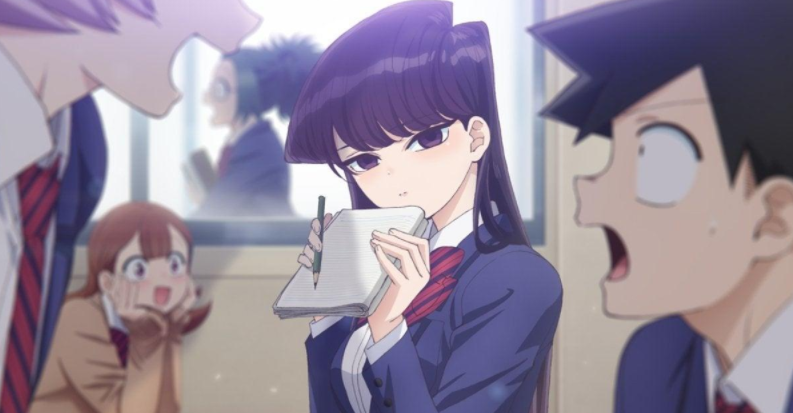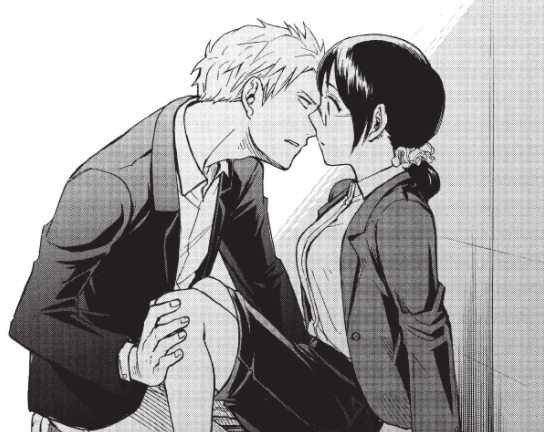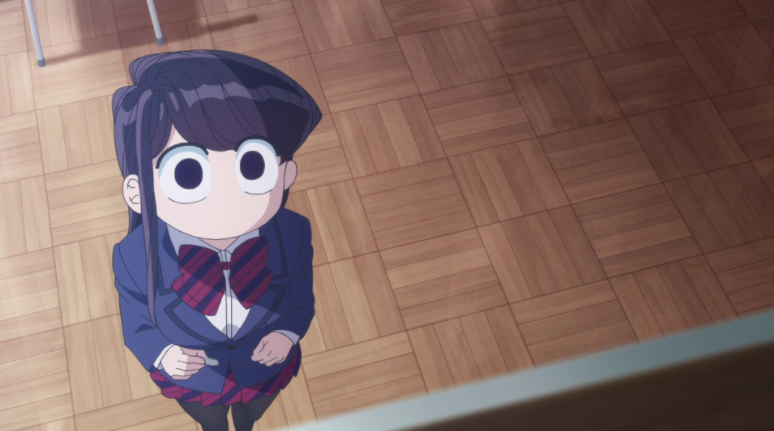Animanga as therapy: Komi-san, Sweat and Soap, and Anxiety
Confession: I have a stammer. Few people notice this when they first meet me, because I’ve spent my entire life trying to mask it. I’ve always found it embarrassing, so when I feel it come along, I stop talking, refusing to let people hear the mortifying “da-da-da” or “ba-ba-ba”. My mouth just freezes, and I try to compensate with a similar word instead. Obviously, this can’t work all the time, and so, during times when I slip up, I’ve been in the awkward position of seeing someone look at me in bemusement, like I’m trying to be funny, and then the realisation dawns on them that I’m a secret stammerer, and then their eyes cloud over with mild embarrassment before they pretend they never heard anything. Needless to say, it makes communicating with new people an ordeal.
It also makes certain media a bit triggering. I know a lot of people found The King’s Speech inspirational, and whilst I like the film (especially the soundtrack), the scenes of King George’s soundless gaping mouth, and his guttural, almost strangled gasps as he drowns in his own inability to speak, sparks a physical reaction in me that I can’t describe. I empathise to the point of feeling that lump in my throat, and all the horrid memories of my tongue failing during important moments come flooding back. Bridgerton was another one. The scene where Simon’s dad rejects him, and the child Simon stands in the middle of a gilded room, totally caged by his own mouth, almost reduced me to tears when I first saw it. It was the first time I wondered if stammering could be seen as a disability. It is certainly debilitating.
Literal tears.
So when I saw the trailer for Komi-san Can’t Communicate, I was wary. But by the end of the first episode, I was totally charmed.
The anime focuses on the beautiful Komi-san, who’s aloof stare, purposeful walk, and enigmatic silence makes everyone around her fall head over heels in love. Her demeanour implies someone who knows the power she has over others, triggering an almost masochistic obsession towards her. It doesn’t help that the school she attends is totally bonkers, and so, her classmates show their affection towards her in the most erratic and frenzied ways. However, the only classmate that tries to look beyond her cool exterior, Tadano, quickly realises that there’s a deeper meaning behind her behaviour.
I hear you, girl!
Komi-san has social anxiety so extreme that she is unable to speak to others. Her childhood and now teenage years are spent in debilitating silence. Every time she tries to speak, her body trembles, her eyes go wild, and only a stuttering shudder emerges from her mouth. There are too many things in her head preventing her from forming proper relationships. What everyone else sees as silent confidence is actually self-doubt and fear. She is desperate to make friends, but due to her own lack of communication skills, and by extension, the poor communication skills of those around her, she is left alone, her anxiety deepening.
The beauty of the first episode is the emphasis that no one has properly seen her for who she is. They see her beauty, her hair, and her poise, but they aren’t looking at her properly. If they did, like Tadano, they would notice that she is in need of help. In a startling sequence towards the end of the first episode, after Tadano correctly guesses Komi’s problem, the pair communicate by writing a full conversation on a blackboard. Komi’s pen becomes more fluid as she gains confidence in their soundless conversation, and by the end of the sequence, the board is filled with writing. She has lots to say, but little means to express herself. Tadano then promises to help her make one hundred friends by the end of their school year.
And the OST during this scene? *chef’s kiss*
What I love about Tadano’s character so far is his willingness to reach Komi on her level. He doesn’t force her to speak or put her in embarrassing situations on purpose, nor does he make her feel small by comparing her behaviour to his, as if he’s the standard. He tries to empathise with her plight, and let her take the lead, whilst also understanding that sometimes, coming out of your comfort zone is beneficial. As Komi’s friendship circle grows, including more crazy students, Komi finds herself being challenged by their communication styles and personalities, and through the diversity of the group, her openness increases.
I was trying to think why Komi-san didn’t affect me in the same way as The King’s Speech and Bridgerton, and I think a large part of it is the comedic aspect. The anime is genuinely funny, and doesn’t take itself seriously, providing a light-hearted take on an otherwise suffocating condition. Oftentimes, stammers and stammerers are portrayed in the media as unpopular outcasts, their entire characters framed within their own insecurity and everyone’s horror towards them. We see them get bullied, rejected, and made into pariahs, or their communication issues are played off for laughs. They’re never popular or confident in themselves, and only after getting “healed” do they transition into wider society. None of these tropes are found in Komi-san, and even though her issue isn’t stammering, I can empathise with the anxiety of wanting to speak but being unable to.
In the same vein, I’ve recently been obsessed with the manga Sweat and Soap, a lovely slice-of-life comedy-drama about Asako from the finance department of LiliaDrop, a famous luxury soap company, who suffers from full-body hyperhidrosis, and Kotaro, the star of the company’s creative team with a superhuman sense of smell.
They randomly bump into each other when Kotaro catches Asako’s scent as she’s admiring the latest company products, and it’s such a sweet fragrance that he demands she allows him to sniff her for inspiration for the next planning meeting. It’s a bizarre concept, but over time, they fall in love, and the story focuses on Asako’s anxiety and confidence issues, and the trauma that has plagued her after being tormented as a child.
Asako is genuinely calm-natured and self-conscious, and it’s implied these aspects of her personality results from her childhood bullying. She’s always paranoid about how she smells and what she looks like, planning her wardrobe for clothes that allow her skin to breathe. She sets a time limit on her outings with people, avoids certain activities, all because she’s nervous about sweating. These insecurities have an effect on her communication skills as she struggles to be honest about her day-to-day feelings with Kotaro, or share her desires or wants, for fear of looking too demanding or causing him an inconvenience.
In Volume Nine and Ten, Asako finally reveals her past to Kotaro, explaining how, after stumbling across one of the girls who bullied her in a restaurant with another friend, all her insecurities and fears returned. The woman in question even called her “a-stinko” again as an offhanded remark, not even thinking how that would affect Asako, despite it being over a decade later. As a child, Asako’s brother came to her defence by hurling dirt at one of the bullying girls (good for him!), but it resulted in him getting in trouble, and Asako being forced to apologise. Since then, she avoids conflict for fear of negatively impacting those she cares about.
Asako’s backstory reminds me of a friend I had when I was thirteen. I fell out with my friendship group and suffered the biggest confidence blow of my life up to that point. It turned me into an introvert, and I didn’t talk as much as I used to, taking much more comfort in video games, online chatrooms, and books instead. I no longer enjoyed going out with friends, and would literally rush home to be alone and enjoy solitary time. The one friend that stayed around was nice, up to a point, then I think she began to prey on my insecurities, always moaning about how I never spoke, that I had nothing to say, that hanging around with me was boring (but she still did it anyway). I found myself paranoid all the time, thinking of conversation starters on my way to school just to stop her from moaning at me.
Years later, silence became a sign for me that things had gone wrong, and a natural break in conversation filled me with dread. I would think “do they think I’m boring? Should I say something now? Is this getting dead?” and the paranoia would build to dangerous levels. Two things that don’t mix are stammering and anxiety, and oftentimes, I found myself desperate to speak to break a silence, but physically unable to. The hold that that ex-friend had on me was so strong, I didn’t let go of my fear of conversational silence until I was well into my twenties. So even though for some, Asako’s breakdown at the sight of seeing her childhood bully might be extreme, I understood her completely. Childhood trauma can leave deep, almost permanent scars.
Both Komi-san and Sweat and Soap are ongoing series, and I can’t recommend them enough. It’s been wonderful to see both Komi and Asako grow in confidence. What they have in common is a supportive network of friends and loved ones that believe in them, and have accepted them for who they are, not for who they might be in the future. I honestly think that’s one of the strongest foundations for a healthy relationship.
And maybe this can be a lesson for the ones on the other side: the classmates that made a big deal out of someone’s insecurity, or the person who refused to see someone for who they actually are, and not a prejudged idea. I would like to think that both series would help the ones who usually instil damage to reflect on their actions, learn from them, and be better.







